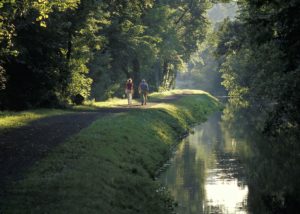Open Letter to
Members of the General Assembly and Governor Wolf
June 21, 2021
The pandemic has caused many to revisit priorities, assumptions, and ways of doing things. On a personal level, Americans have dramatically increased their outdoor recreating, often resulting in the doubling or more of park, preserve, and trail visitation. And many are starting to take advantage of suddenly having more flexibility than ever before on choosing where to live.
On a policy level, it is crucial for state government to recognize that the future of Pennsylvania’s economy and finances depends substantially on having swimmable and fishable streams; unquestionably safe drinking water; abundant public spaces for hunting and nature-watching; and well-maintained parks and trails for families and individuals. It is crucial for state and local government coffers; it is crucial for the financial well-being of the families that live here.
If people perceive that water quality lags other states or that other states provide better recreational opportunities, more and more of them can vote with their feet. With this in mind, consider that:
If people perceive that water quality lags other states or that other states provide better recreational opportunities, more and more of them can vote with their feet. With this in mind, consider that:
- 25,468 miles of Pennsylvania waterways are unsafe for drinking, swimming, and fishing.
- Our State Parks and Forests require nearly $1 billion in restoration and repair work and local parks and community green spaces similarly have suffered from insufficient investment.
But this does not need to be Pennsylvania’s narrative. We want leaders of established and startup businesses, graduates, and tourists to see a state that is fixing up its past messes (e.g., acidified and sediment-filled streams), responsibly addressing present problems (e.g., polluted runoff from farms and urban areas), and otherwise actively working to make Pennsylvania a more pleasant place to live, work, and play (e.g., safe and well-maintained parks).
This can be seen when the General Assembly chooses to invest in this work, and people can observe the work being done—the lasting improvements being made.
For many years, the Pennsylvania General Assembly, faced with tight budgets, has been unable to significantly boost state investments in making these improvements. Factoring in inflation, we have been moving backwards. This year presents an opportunity to break this pattern.
The Growing Greener Coalition urges the General Assembly to invest a minimum of $500 million (7%) of state government’s $7 billion share of American Rescue Plan money in green infrastructure projects that Pennsylvanians overwhelmingly support, can be implemented now, and will continue to deliver value for decades to come.
From nature-based solutions that reduce flooding impacts and stream degradation (e.g., riparian forest buffers on farms and wetland restoration), to passive treatment systems for abandoned mine drainage, to rehabilitation of the parks and trails that underpin a large part of the Commonwealth’s tourism and outdoor recreation economies, these investments will support:
- Myriad small business and good-paying jobs now for all the infrastructure project work to be performed[1]; and
- The jobs and economic prosperity of the future as people choose to stay or relocate into a Pennsylvania attentive to their quality-of-life concerns.[2.]
Improvements to our shared environment can drive our economy and communities to new levels of prosperity. Please take advantage of American Rescue Plan funds to make this happen.
For more information, please reach out to the people and organizations of the Growing Greener Coalition including but not limited to:
Chesapeake Bay Foundation
Shannon Gority, PA Executive Director
[email protected]
Ducks Unlimited
Nikki Ghorpade, Government Affairs Representative
[email protected]
Conservation Voters of PA
Joshua McNeil, Executive Director
[email protected]
Foundation for Pennsylvania Watersheds
John Dawes, Executive Director
[email protected]
Lancaster Farmland Trust
Jeffrey Swinehart, Chief Operating Officer
[email protected]
The Nature Conservancy, PA/DE Chapter
Ronald L. Ramsey, Senior Policy Advisor
[email protected]
Natural Lands
Oliver P. Bass, President
[email protected]
Theodore Roosevelt Conservation Partnership
Derek Eberly, Pennsylvania Field Organizer
[email protected]
PennFuture
Jacquelyn Bonomo, President & CEO
[email protected]
Pennsylvania Environmental Council
John Walliser, Senior Vice President
[email protected]
The Trust for Public Land
Owen Franklin, PA State Director
[email protected]
Pennsylvania Parks and Forests Foundation
Marci Mowery, President
[email protected]
Pennsylvania Recreation & Park Society
Tim Herd, CEO
[email protected]
Sierra Club PA Chapter
Jen Quinn, Legislative and Political Director
[email protected]
Rails-to-Trails Conservancy
Tom Sexton, Northeast Regional Director
[email protected]
The Conservation Fund
Kyle D. Shenk, Northeast Region Director
[email protected]
Trout Unlimited
Jennifer Orr-Greene, Eastern Policy Director
[email protected]
WeConservePA
Andrew M. Loza, Executive Director
[email protected]
Western Pennsylvania Conservancy
Cynthia Carrow, Vice President
[email protected]
[1] Projects involve surveyors, appraisers, legal services, engineers, planners, drafters, environmental remediators, hydrologists, geologists, agricultural consultants, horticulturalists, architects, landscape architects, landscapers, carpenters, electricians, plumbers, heavy equipment operators, painters, roofing contractors, fencing installers, paving contractors, material delivery, sign makers, archaeologists, and arborists. Supplies and equipment are needed from nurseries, lumber yards, quarries, building material suppliers, hardware stores, equipment manufacturers, and equipment rental businesses. [2] See the numerous studies documenting the benefits in the Economic Benefits section of https://conservationtools.org.
